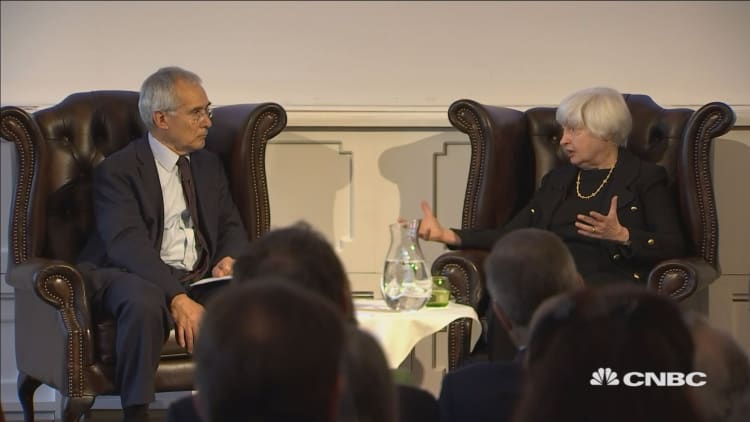Global debt has hit a record level in the first quarter of this year, mainly driven by emerging markets, raising questions of whether there will be another financial crisis in the near future.
Data from the Institute of International Finance showed that global debt reached $217 trillion in the first quarter of this year, or 327 percent of gross domestic product.
"The debt burden is not distributed evenly. Some countries/sectors have seen deleveraging while others have built up very high debt levels. For the latter, rising debt may create headwinds for long-term growth and eventually pose risks for financial stability," the IIF said in its Global Debt Monitor report on Tuesday.

On Tuesday, U.S. Fed Chair Janet Yellen told an audience in London that banks are in a "very much stronger" position and another financial crisis is unlikely "in our lifetime."
The 2008 financial crisis began with high indebtedness levels by U.S. households.
But Yellen's remarks aren't' consensual.
"I think Yellen's comment -- if I am interpreting it correctly -- is a huge hostage to fortune. The words Titanic and unsinkable spring to mind," Erik Jones, professor of international political economy at Johns Hopkins University, told CNBC via email.
Casrten Brzeski, senior economist at ING said that "high debt levels mean that the debt crisis has not been solved, yet. Neither in the US, nor in the Eurozone. Increasing debt levels in Asia and other emerging market economies also show that a structural change has not yet taken place."
"All of this, however, does not mean that we are at the verge of a other financial crisis. Central banks and low interest rates have and should continue to limit this risk significantly," he added via email.
In the U.K., however, the Bank of England seems more cautious about the future. It instructed U.K. banks to raise their capital ratios as a precautionary step in the event of an economic slowdown. In its Financial Stability Report released Tuesday, the central bank noted that Brexit, high levels of indebtedness in China and an increase in consumer credit in the U.K. as potential risks.
According to the IIF, despite the fact that debt levels have slowed down in mature economies, emerging market debt rose 5 percentage points from a year ago.
"Total debt in emerging markets (excluding China) has increased by some $0.9 trillion to over $23.6 trillion in the first quarter of 2017—mainly driven by Brazil (up $0.6 trillion to $3.6 trillion) and India (up $0.2 trillion to 2.9 trillion)," the IFF said in its report.
China poses a great risk in itself with households accelerating their borrowing.
"The household debt-to-GDP ratio hit an all-time high of over 45 percent in the first quarter of 2017 —well above the Emerging Market average of around 35 percent. In addition, our estimates based on monthly data on total social financing suggest that China's total debt surpassed 304 percent of GDP as of May 2017," the IIF noted.
On the other hand, there's been a steady decline in euro area private sector debt, from $103.4 trillion in the first quarter of 2016 to $97.7 trillion in the first quarter of this year.
The IIF warned that there's over $1.9 trillion of emerging market bonds and syndicated loans maturing through to the end of 2017, with redemptions in USD making for about 15 percent of the total.


